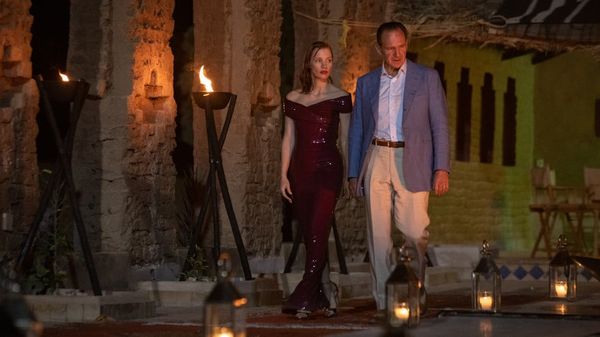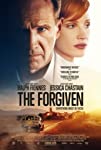Eye For Film >> Movies >> The Forgiven (2021) Film Review

They’re arguing with each other from the start, in that manner particular to people who have been in love for a long time and have got out of the habit of asking themselves if they still are. He’s a certain kind of Englishman, of the old school, apt to make snide remarks about foreigners even when he’s in their countries. Her responses are a mixture of embarrassment and protectiveness. She’s quite a bit younger than he is but their clothing and speech suggests a class background where that would be expected. After the accident, he will eventually remind her that he awareness of his drinking means she could be considered an accessory. “I’ve felt like an accessory for a long time now,” she says.
The accident claims the life of a young Arab boy. It was dark, the roads should have been empty, it was an accident, David (Ralph Fiennes) tells everybody within earshot, but mostly himself. Jo (Jessica Chastain) is in a panic now, feeling for the boy’s family, frightened for herself. They proceed to the restored palace owned by David’s friend Richard (Matt Smith), where he had his boyfriend are holding a days-long party. There, the body is laid out. The police are called. This can be made to go away, Richard explains. But when the boy’s father (Ismael Kanater) arrives, talking of honour and tradition, David agrees to go with him to his remote desert home in order to see the boy laid to rest.
Why does he do so? This is one of the film’s central questions. It is not a difficulty for the script. Events flow naturally enough, yet everyone will continue to analyse this question. Jo, who is worried and tired of being worried. The father, a shrewd judge of character but also a man swept away by grief. Their go-between, Anouar (Saïd Taghmaoui), who is alert to the complexity of relations between the Arabs and wealthy outsiders. And David himself, who has perhaps been aware that he was heading towards crisis for a long time before the accident actually happened.
John Michael McDonagh’s deftly balanced film, based on the novel by Lawrence Osborne, places scenes of David’s experiences in the desert side by side with the casual debauchery at the palace, to which Jo gradually gives herself over as trying not to worry about her husband warps into imagining a life without him in it. The stellar cast (which also includes Caleb Landry Jones and Mourad Zaoui) is on fine form, bringing to life characters who don’t actually do very much but whose small gestures are heavy with meaning. The Arab staff at the palace function as a kind of chorus, observing everything and filtering it through an acute awareness of historical and contemporary politics. “Little by little, the camel enters the couscous,” one of them says, and there’s a musical flourish which makes it sound sinister. Perhaps it is, though all it really means is that complicated situations will work themselves out over time.
Lorne Balfe’s magnificent, melodic score shapes our sense of time passing, just as shots of the open desert, of the emptiness around the palace, add to our sense that all that history is present and immediate. Arriving at the dead boy’s home, David gets, for the first time, a real sense of how little he and his family have had to survive on. The father intimates that they have no resources left, that there will be no future for his people; it is as if the place has been sucked dry. Back in the palace, casual conversation takes in some of the abuses of colonialism and of the later period when Europeans used this place for sex tourism. Ibn the desert, David discovers that the dead boy was not a forgettable innocent but a complicated character in his own right. There are aspects of this which the audience is privy to yet which neither he nor the father will ever know. Driss’ full story is forgotten in the sand. It is this human-ness which gradually leads David towards understanding and the film towards its end.
“We don’t need to talk,” David will say later, and perhaps it’s true. It’s difficult to see what this could change. McDonagh’s film broaches the conversation in a different way. The scale of the horror at work here means that nothing can be understood in isolation. David – Fiennes’ finest creation to date – was, we are told, a public schoolboy, and displays a tutored moral distance which those familiar with such institutions will recognise at once. As soon as the guests are gone, Richard expresses distaste for the party. Was any of this worth it?
See this film.
Reviewed on: 01 Jul 2022















